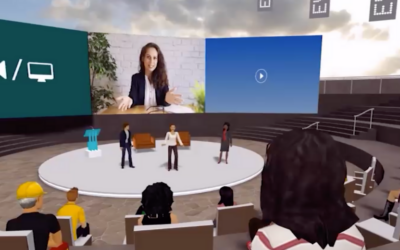Learn how to host a virtual event and what to look for in a virtual meeting master of ceremonies or moderator
There’s no doubt Virtual Events have taken over, and with the current state of global affairs, it isn’t clear how soon that will change. We recently met with Jason Alpert, owner, and master of ceremonies with Alpert Enterprises, to talk about what to look for in a virtual event master of ceremonies and best practices in hiring talent for your corporate meeting or event.
AMI: Why do people use a master of ceremonies in their events?
Jason: Overall, the master of ceremonies runs the event and should be fully vested and part of the process. Many people think the master of ceremonies is simply a presenter and they want to choose their company’s CEO. However, the MC should work more like an event consultant, working hand in hand with the full program scripting and agenda.
AMI: Your description sounds like it would apply in both live events and virtual events.
Jason: Right. The master of ceremonies should really be driving the program and managing the ebbs and flows because they know the big picture. It’s fine for a CEO to have the spotlight, but the master of ceremonies is there to troubleshoot and help with setting and managing the energy of the event, virtual or not.
AMI: I’m not seeing very many masters of ceremonies’ on virtual events but I expect that will change, especially as larger events begin being hosted virtually. What advice do you have for people looking to make this shift?
Jason: Most of the work of the master of ceremonies is done during prep time, not just at the event. Be sure to work with a company that understands this.
Second, use a high-quality technology company to manage the live stream. It needs to look really sharp for participants. Grabbing and capturing the attention of participants who can easily become distracted is a big obstacle to overcome with virtual events. Who you partner with will make a big difference in the participant experience.
Third, when hiring a company for MC services, it’s important there is a good relationship between the master of ceremonies and the tech company. There will need to be a lot of communication to make the production look and feel like a TV show. The master of ceremonies needs to know where to turn for problem-solving, which can happen at any time, whether live or virtual.
Additionally, the master of ceremonies must have a comfort level in front of a camera rather than a crowd. Their background and skill set will need to be stronger towards broadcasting than interaction with a live audience. There are different skill sets required and you need to be aware of that. A background in television would be ideal for a virtual event MC.
AMI: Those are some really good tips. What else are masters of ceremonies responsible for?
Jason: Overall the master of ceremonies monitors information such as chat, and is really comfortable with the event’s mission, goal, and branding so they can fill time if needed. They also would monitor participants during the event.
AMI: What else is important in virtual events that we haven’t addressed yet?
Jason: Content. It needs to be short and efficient to create a compelling program, however, those aren’t one in the same. I’ve done a lot of programs that are so-called “long,” but are very efficient and compelling/engaging. Keep in mind that it’s not how long something is, but rather how long it feels.
Don’t get hung up exclusively on the clock- get hung up on producing a compelling and engaging program. People have so many options to be distracted, the event has to really keep them involved.
Also, I suggest doing a full-dress rehearsal, going through the entire program including playing videos, and making sure all the graphics work as intended. Use pre-recorded videos as much as possible to limit tech issues.
AMI: Using pre-recorded videos seems strange. How does that work?
Jason: People are often concerned that if it isn’t all live it won’t have the same energy. Great shows, like Nightline, feel very much live but are pre-recorded. During one event, we pre-recorded the speaker’s presentation, and then she wore the same outfit for live Q&A. It was assumed it was all live, but the pre-recording allowed for time management and a smoother transition.
From a technology perspective, we can only control so much, so pre-recording lets you focus on the live elements like chat, rather than on delivering content at the moment.
AMI: What are you seeing that is working really well in virtual events, or not so well?
Jason: Virtual events are allowing organizations to cast a wider net. For example, a company that used to hold local events was able to get participants from 38 states and 6 countries by making the event virtual. It eliminated the need for travel or restrictions on room size. Selling out is practically impossible.
As far as what’s not as successful, there is a lot of networking value from live events that is lacking in virtual ones. One way to overcome this is with small breakout rooms that allow participants to mix and mingle before, after, or during events. All of us in the industry are watching what others are doing, seeing what works, and fine-tuning them for future events.
Creating high-quality virtual events that engage the participants and keep things running smoothly and professionally is accomplished easily with AMI’s Virtual Meeting Solutions.


